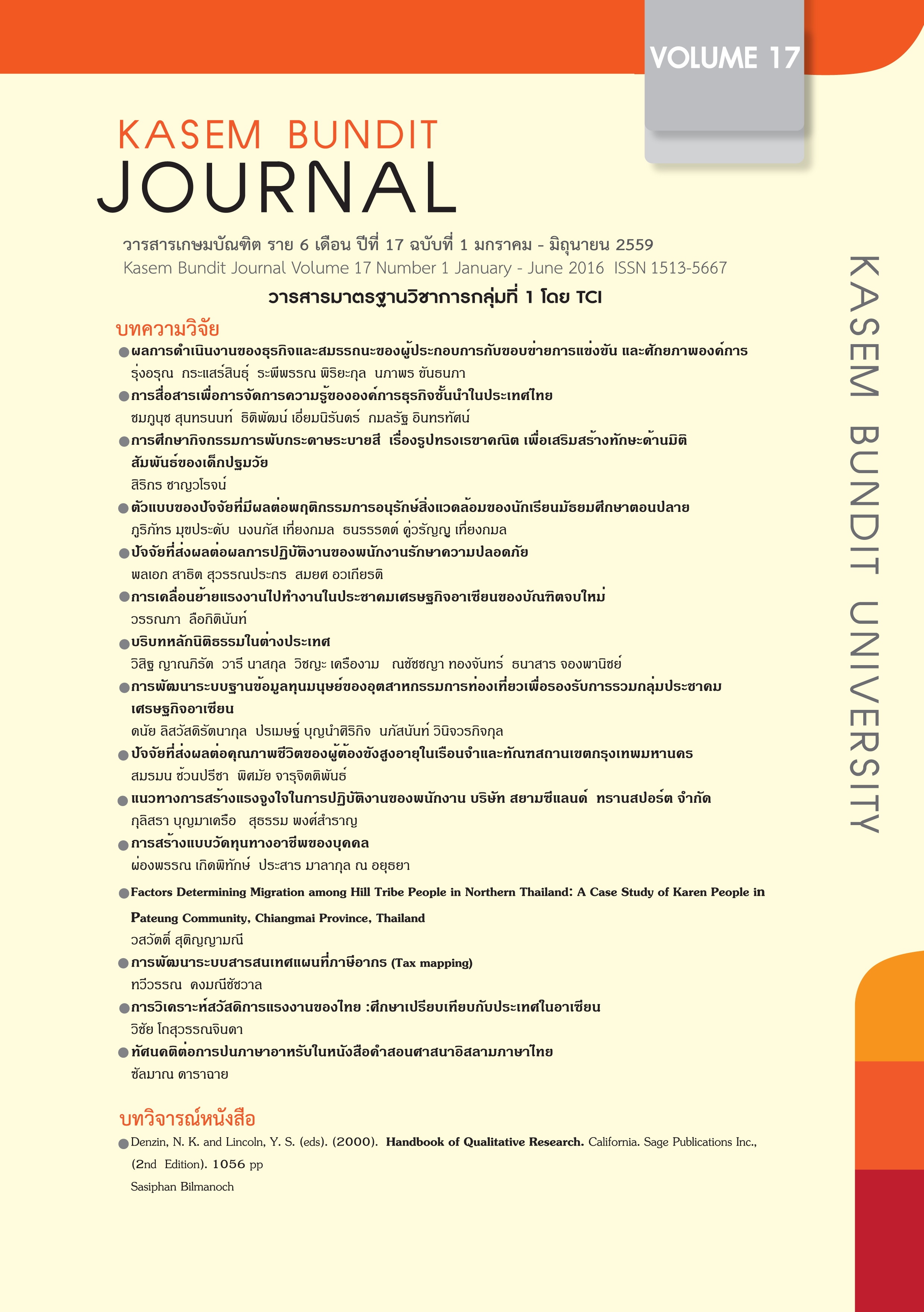Factors Determining Migration among Hill Tribe People in Northern Thailand: A Case Study of Karen People in Pateung Community, Chiangmai Province, Thailand
Keywords:
Migration, Ethnicity, Return migration, การย้ายถิ่น กลุ่มชาติพันธุ์ การย้ายถิ่นกลับAbstract
Abstract
Rural development program since the 1997 economic crisis has contributed to a rise of return migration from urban to rural areas. There were certain parts of Thailand where there was an on-going flow of rural-urban migration of labor. This was particularly the case for vulnerable and marginalized hill tribe people. Besides the problem of children and elderly left behind, the prospects for their sustained economic and social development were also expected to be jeopardized. This study focused on the Karen community, and was a comparative study of migrants and non-migrants in the Pateung Catholic Community in Northern Thailand, where there was a very high rate of migration of up to nearly 30%. By means of participatory observation and in-depth interview and within the framework of neoclassical economic theory and new economics of migration, it was revealed that the factor which was the main reason for migration of the hill tribe in the Pateung Catholic Community in Northern Thailand was the socio-economic factor, i.e., developing their own personal and family economic status. Also, the patterns of migration, which applied to individuals and the whole family, exhibited the trend of return migration back to their homeland as well.
บทคัดย่อ
การพัฒนาพื้นที่ชนบทตั้งแต่วิกฤตเศรษฐกิจในปีพุทธศักราช2540 ทำให้จำนวนการย้ายถิ่นแรงงานจากสังคมเมืองสู่ชนบทมีปริมาณเพิ่มขึ้น แต่อย่างไรก็ตามยังคงมีกระแสของการย้ายถิ่นแรงงานจากสังคมชนบทสู่สังคมเมืองอยู่โดยเฉพาะอย่างยิ่งกรณีของกลุ่มชาติพันธุ์ชาวไทยภูเขา ซึ่งเป็นสาเหตุหนึ่งของปัญหาการถูกทอดทิ้งของวัยพึ่งพิงทั้งวัยเด็กและผู้สูงวัย อีกทั้งมีผลกระทบอย่างรุนแรงต่อโอกาสในการพัฒนาเศรษฐกิจและสังคมอย่างยั่งยืนอีกด้วย การศึกษานี้เป็นการศึกษาชุมชนชาติพันธุ์ชาวไทยภูเขาเผ่ากะเหรี่ยง โดยการศึกษาเชิงสำรวจและการสัมภาษณ์เชิงลึกระหว่างผู้ย้ายถิ่นและผู้ไม่ย้ายถิ่นในชุมชนกะเหรี่ยงคาธอลิคป่าตึงซึ่งตั้งอยู่ในเขตภาคเหนือของประเทศไทยโดยชุมชนนี้มีอัตราการย้ายถิ่นสูงถึงร้อยละ 30 โดยใช้ทฤษฎีการย้ายถิ่น Neo-Classical Economics และทฤษฎีการย้ายถิ่นทางเศรษฐศาสตร์สมัยใหม่ ผลของการศึกษาพบว่าปัจจัยที่ทำให้เกิดการย้ายถิ่นของกลุ่มชาติพันธุ์ชาวไทยภูเขาในเขตภาคเหนือที่มีอิทธิพลอย่างมากนั่นก็คือปัจจัยทางเศรษฐกิจและสังคม ซึ่งเป็นปัจจัยหลักในการย้ายถิ่นเพื่อสร้างเศรษฐฐานะให้กับตนเองและครอบครัว โดยมีทั้งรูปแบบการย้ายถิ่นเพียงบางคนในครอบครัว และการย้ายถิ่นทั้งครอบครัวซึ่งส่งผลให้เกิดแนวโน้มการย้ายถิ่นกลับไปยังภูมิลำเนาของตนอีกด้วย
Downloads
How to Cite
Issue
Section
License
ทัศนคติ ความคิดเห็นใด ๆ ที่ปรากฏในวารสารเกษมบัณฑิตฉบับนี้เป็นของผู้เขียน โดยเฉพาะ มหาวิทยาลัยเกษมบัณฑิตและบรรณาธิการ ไม่จำเป็นต้องมีความเห็นพ้องด้วย







